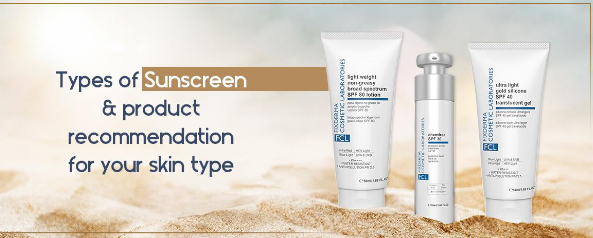When it comes to sun protection, sunscreen is non-negotiable. It’s the easiest and most effective way to shield your skin from the harmful effects of UV radiation, which can cause premature aging, sunburn, and even skin cancer. But with so many types of sunscreen on the market, it can be overwhelming to choose the best one for your skin type. In this article, we’ll break down the different types of sunscreen and help you determine which one is best for you.Elevate your skills and embark on a rewarding career in the beauty industry with Dermagrafix’s comprehensive Permanent Makeup Training. Learn the art of enhancing natural features and creating stunning, long-lasting results.
- Chemical sunscreen
Chemical sunscreen is the most common type of sunscreen available. It works by absorbing UV rays and converting them into heat, which is then released from the skin. Chemical sunscreens typically contain ingredients like avobenzone, oxybenzone, octinoxate, and homosalate.
Chemical sunscreens are generally lightweight and easy to apply, but they can be irritating for some people, especially those with sensitive skin. They can also be more likely to cause breakouts or exacerbate acne-prone skin. If you have sensitive skin or are prone to breakouts, it may be best to avoid chemical sunscreens.
- Physical sunscreen
Physical sunscreen, also known as mineral sunscreen, contains active ingredients like zinc oxide and titanium dioxide, which sit on top of the skin and create a physical barrier to block UV rays. Because they don’t absorb into the skin, physical sunscreens are less likely to cause irritation or breakouts. They’re also less likely to degrade in the sun, making them a great choice for prolonged outdoor activities.
The downside to physical sunscreens is that they can be thicker and more difficult to apply than chemical sunscreens. They can also leave a white cast on the skin, which may be noticeable on darker skin tones. However, many newer formulations of physical sunscreen are now available that are easier to apply and blend into the skin more seamlessly.
- Combination sunscreen
Combination sunscreen combines both chemical and physical sunscreens to provide broad-spectrum protection. This type of sunscreen typically contains a combination of active ingredients, such as zinc oxide and avobenzone. Combination sunscreens can provide the benefits of both types of sunscreen, including easy application and broad-spectrum protection, while minimizing the potential downsides of each.
- Tinted sunscreen
Tinted sunscreen is a type of physical or combination sunscreen that contains a light pigment to blend into the skin and provide a subtle coverage. Tinted sunscreens are a great option for those who want to simplify their skincare routine or who want to even out their skin tone without applying foundation or concealer. They can also be a good choice for those with sensitive or acne-prone skin, as they often contain fewer ingredients than traditional makeup products.
- Water-resistant sunscreen
Water-resistant sunscreen is designed to stay on the skin even when it’s exposed to water or sweat. This type of sunscreen can be especially important for those who plan to spend time in the water or engage in other outdoor activities that cause them to sweat. Water-resistant sunscreens are available in both chemical and physical formulations.
When it comes to choosing the best type of sunscreen for your skin type, there are a few key factors to consider. First and foremost, you’ll want to look for a sunscreen that provides broad-spectrum protection against both UVA and UVB rays. You’ll also want to consider your skin type and any sensitivities or concerns you may have.
If you have oily or acne-prone skin, a physical or combination sunscreen may be a better choice, as it’s less likely to clog pores or cause breakouts. If you have dry or sensitive skin, a chemical or combination sunscreen may be a better option, as it will absorb more easily into the skin and provide hydration. And if you plan to spend time in the water or engage in outdoor activities, it is ideal to use a broad-spectrum sunscreen lotion.
Which is the best sunscreen for oily skin?
The best sunscreen for acne-prone skin and oily skin are
- Physical Sunscreen- Chemfree SPF 30 by FCL Skincare
It is a physical sunscreen that offers broad-spectrum protection against both UVA & UVB rays. It has physical blockers like zinc oxide and titanium dioxide that protect the skin from harmful rays and also protect our skin from irritation and burns.
- Chemical absorber-free formulation
- Suits all skin types
- PA+++
- Shows no white casting of the skin
- Non-comedogenic formulation
- Cosmetically elegant product
- Chemical Sunscreen- Silicone SPF 40 by FCL Skincare
It is an ultra-light sunscreen that provides superior sun protection against various harmful lights, including UVA, UVB, Blue light, Infra-Red and High Energy Visible Light. It also protects the skin from the onslaught of environmental pollutants.
- Offers SPF 40 & PA+++ protection
- Water-resistant formulation
- Effective antipollution against PM 2.5
- Non-comedogenic, fragrance-free formulation that also suits sensitive skin
Which is the best sunscreen for dry skin?
The best sunscreen for dry skin by FCL skincare is
- Light Weight SPF 80 Sunscreen Lotion
This sunscreen is a lightweight, non-greasy, broad-spectrum SPF 80 lotion that increases skin defence and resistance to UV light, blue light, infrared light, and high energy visible light.
- Protects the skin from the harmful effects of Infra-Red, High Energy Visible light, Blue Light, UVA & UVB
- Offers SPF 80 & PA++++ protection
- Water-resistant formulation
- Effective antipollution against PM 2.5
- Non-comedogenic

